Could there really be a downside to acquiring thousands of followers in a day?
Facebook, Instagram, Twitter, Tumblr, and many other forms of social media platforms are full of “ghost accounts.” Ghost accounts can refer to either accounts that are inactive or accounts that are created for the purpose of being “fake followers.” In a Digital Trends article, Jam Kotenko states “studies have identified that Twitter has more than 99,000 fake accounts” (Kotenko, 2013).
Celebrities, companies, and individuals are creating a demand for quick followers, and now there is a growing market to supply it. Fake followers can be purchased on specialized websites, such as Buycheapfollowersfast.com, which gives their clients the options of purchasing a selection of Twitter followers, Facebook likes, Instagram followers, or YouTube views.
If you don’t feel comfortable with trusting these sites, you can turn to eBay, with “ghost follower packages” being sold at prices ranging from $10 – $500 depending on the follower count.
Why Would A Brand Do This?
So, why would an organization consider purchasing fake followers? The answer is obvious enough; a large following inspires confidence in the brand. If a company is just starting out, it is much quicker to purchase a following than actually building a real one. Furthermore, a large following attracts more real followers. That is, when a new consumer sees that thousands or millions are already following your brand, they believe that there must be a reason for it, and are more likely to follow you as well.
In the article “The Controversial Case for Buying “Fake” Social Media Followers,” Alex Bentley describes how this fake popularity serves to aid real popularity. “Perceived popularity (as opposed to actual popularity) can sometimes work as a stepping-stone, a short-cut for members of larger or unfamiliar groups, to knowing whether someone is good enough to follow” (Bentley, 2014). Essentially, social media actions are sheep-like, and individuals feel more comfortable following the actions of the masses.
The Downside
Like anything that sounds too good to be true, there can be severe downsides to purchasing your following. This point was clearly illustrated a couple days ago with popular singer Rita Ora. This British singer has 3.9 million followers on Twitter, and on Halloween, she sent out this tweet:
In the following hours, the tweet received only 2,000 retweets despite Rita’s massive following, and as a result the singer proceeded to delete the tweet.
Currently, Rita Ora is claiming that her Twitter account was hacked, and that she never sent out that tweet. Dozens of articles have popped up in the last few days accusing Rita of having a fake Twitter following. According to TwitterAudit.com, Rita Ora has a massive 1.3 million fake Twitter accounts following her.
This incident could easily happen to an organization with a large fake following, and could result in an extremely negative public perception for the brand. In fact, if found out, real followers could be lost.
Don’t Forget the Real Reasons for Followers
More important than the possibility of a high publicity incident such as the one that happened to Rita Ora, is the reason for having followers in the first place. Brands attempt to gain followers so that they may have an open communication channel to contact their consumer base, ask questions, listen to opinions and criticisms, and promote new products or new information to their consumers.
Asking questions, sharing coupons, or sending out opinion polls to a ghost following is just a waste of time. Instead, having a genuine following serves as a two way street for the brand and its consumers to have real-time conversations, and allow for opportunities for the consumers to interact with the brand.
In the end, this short cut defeats the purpose of your brand’s reason for having social media accounts. Ghost followers will not retweet or share your information, will not respond to questions, will not purchase items promoted, and will skew consumer data collection results. Just say no to purchasing ghost accounts.
Reference
Bentley, Alex. (2014, September 2). The Controversial Case for Buying “Fake” Social Media Followers. The Guardian. Accessed
November 7, 2014 from http://www.theguardian.com/media/2014/sep/02/the-controversial-case-for-buying-fake-social-media-
followers.
Kotenko, Jam. (2013, July 3). Surprise! Twitter is Still Teeming with Fake Accounts. Digital Trends. Accessed November 7, 2014 from
http://www.digitaltrends.com/social-media/guess-what-twitter-is-still-teeming-with-fake-accounts/.
Linares, Veronica. (2014, November 6). Rita Ora Denies Twitter Promo Fail, Says Her Account Was Hacked. UPI.com. Accessed
November 7, 2014 from http://www.upi.com/Entertainment_News/Music/2014/11/06/Rita-Ora-denies-Twitter-promo-fail-says-
her-account-was-hacked/4731415285163/.
TwitterAudit. (2014). Rita Ora’s Audit. TwitterAudit.com Accessed November 7, 2014 from https://www.twitteraudit.com/ritaora.
Zarell, Rachel. (2014, November 2). Rita Ora Claims She Was “Hacked” After Massive Twitter Fail. Buzzfeed. Accessed November 7,
2014 from http://www.buzzfeed.com/rachelzarrell/rita-ora-twitter-fail.


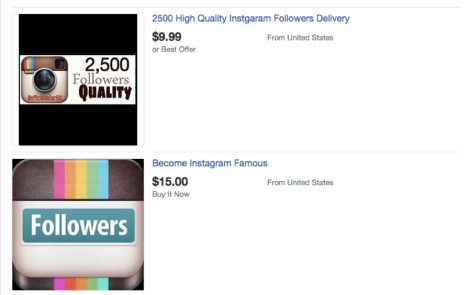
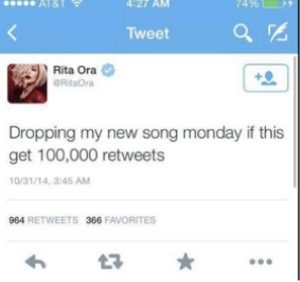
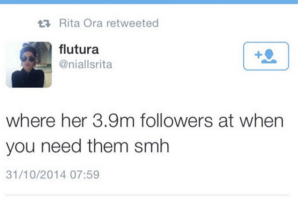

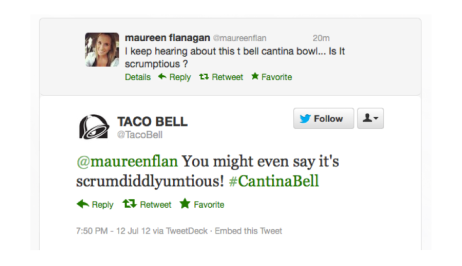
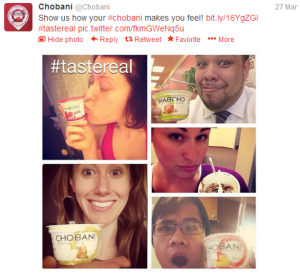
Nice blog post, good writing. Great example with Rita Ora, I never knew that happened. I agree with a lot of what you said. But I think the power of perceived popularity is strength that companies cannot look over because it is a factor in getting real followers which leads to goal conversion. I know I sure have followed people just based on perceived popularity. A interesting spin on this subject is the fake instagram likes that are occurring now. I think eventually fake twitter accounts will be able to use hashtags and retweet to have a massive influence.
LikeLike
I really enjoyed reading this blog! I never actually knew that brands could simply buy followers, so this is something new to me! I disagree with this idea of buying followers simply because it’s cheating customers into liking something because of its popularity. In a way it is a smart way for them to create more awareness for themselves. But brands should be able to form their recognition online due to their social media campaigns or just by being an awesome brand. If they need to buy followers then they are being unethical and putting themselves under the impression of being untrustworthy. It makes you wonder what else those brands could be doing behind the scene as a company just to simply make themselves look better in the real world.
LikeLike
It could be very problematic for companies who want to create an interactive social media strategy if they buy all their followers
LikeLike
I see the point you’re trying to make. How a fake following could lead to negative publicity, and then put the company in a bit of trouble, at least when it comes to public perception. But I see the positives as well. These fake followers would not be there if there wasn’t a need, and the need comes from people believing that their own self-worth can be measured in likes, comments, tweets, re-tweets, or followers. Our generation today is so concerned with how they are viewed by the outside world, that they will go to great lengths to create an image, even if that image is more of an alias then a true reflection of themselves. So I pose a question to you, do you think the use of fake followers will continue to grow as humanities need for validation becomes increasingly materialistic? Or do you think we will all wake up one day, as a whole, and realize that little Tom on the other side of the world doesn’t necessarily need to know everything about our lives, or like our pictures, posts and comments, to validate our existence?
LikeLike